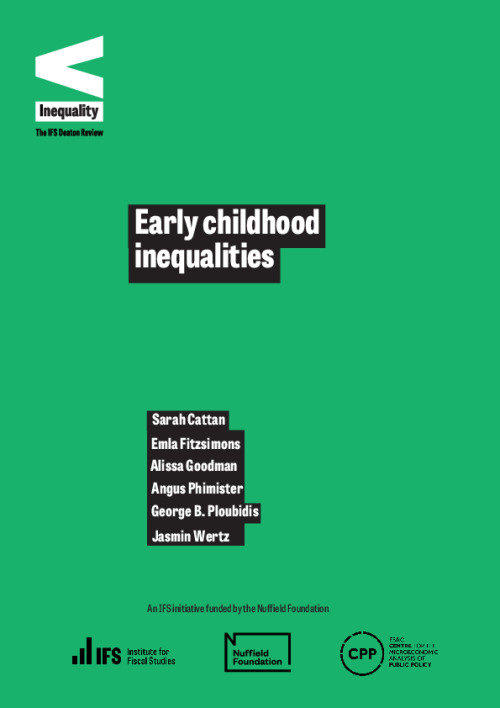While there is widespread agreement in societies like the UK that every child has the right to a secure childhood and the opportunity to develop to their full potential, this does not match with reality for many of the 4 million children under the age of 5 currently living in the UK.
Through the lottery of birth, children are born into different socio-economic circumstances and grow up in environments that are remarkably different from each other. These deep environmental inequalities are present in a multitude of dimensions including educational, emotional and material environments. Increasing evidence shows that genetic differences also matter, and that environmental inequalities correlate and interact with inequalities in genetic endowments. Together, this means that by the time children enter school, their levels of cognitive, socioemotional and physical development are already vastly unequal.
Inequalities in early childhood – used in this chapter to denote the period from birth to school entry – are concerning not only because of the implications for children’s immediate lives and well-being, but also because of their importance for later development. Early childhood is a critical period for laying healthy foundations for subsequent cognitive, social, emotional and physical development and functioning, which in turn play key roles in shaping people’s economic, social and health trajectories. Without timely and appropriate mitigation, the developmental gaps already present between 5-year-olds from the most and least advantaged backgrounds persist and can widen, contributing to later inequalities in economic and social outcomes, much of which the IFS Deaton Review is about.
These stark and longstanding inequalities are not confined to the UK. In many countries where early childhood development indicators are available, we see developmental gaps emerging from the earliest age between children from different socio-economic, ethnic and geographical backgrounds. However, this dire evidence needs to be balanced against the messages of hope and opportunity that emerge from a wide range of disciplines: there is a real potential for early childhood intervention to address these inequalities effectively. However, what the many examples of well-crafted and robustly evaluated policies around the world also point to is that early childhood intervention is not a silver bullet and, just like any policy, requires careful design and consideration of the institutional and social system it is aimed to operate in.
The past three decades have seen a rise in public awareness about the importance of early childhood, alongside large increases in public spending on education and care services for the under-5s across many countries, including the UK where early education and childcare have become an increasingly important part of the education spending landscape (Farquharson et al.,2021). Despite these important investments, we are still making very slow progress at reducing early inequalities, which remain stubbornly persistent despite some fluctuations over the past two decades. The COVID-19 pandemic is a further setback, with all signs pointing to the fact that it will have exacerbated early inequalities (Cattan, Farquharson et al., 2021).
We are now at an important crossroads. In light of evidence that early inequalities have not substantially budged, it would be all too easy to dismiss the decades of policy reform and public investments that have been made as ineffective. But, of course, we do not observe what would have happened to early inequalities in the absence of these reforms and investments – over a period when inequalities in many of the dimensions that matter for child development, including child poverty, have been on the rise. But it would also be a mistake not to critically examine what UK policy has achieved over the past three decades and whether it is heading in the right direction, when we know that the life chances of children are in large part conditioned by the social, emotional and economic environments they are born into.
As we ‘build back better’, there is an opportunity and an urgent need for fresh thinking on how to address the complex needs of disadvantaged children and their families so that we can drastically reduce the inequalities that exist from the time children are born – and indeed even beforehand. The objective of this chapter is to contribute to this thinking by bringing together systematic and UK-focused evidence on the nature, magnitude and long-term implications of early childhood inequalities, and by providing a critical appraisal of how policy aimed at supporting very young children and their families has fared in terms of reducing inequality. The evidence we provide gives a motivating call to policy to support the complex needs of parents of infants and young children, alongside addressing the structural inequalities that can have devastating long-term consequences for children.













